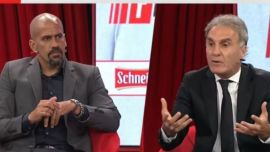Miguel Ángel Pesce, a University of Buenos Aires economist, will lead Argentina’s Central Bank during the administration of president-elect Alberto Fernández, who announced his Cabinet appointments in a press conference on Friday, December 6.
Pesce previously served as the vice-president of the Central Bank from September 2004 until December 2015. He was the longest-serving board member of the Central Bank in history.
Since leaving his position at the Central Bank, he has served as the president of the Tierra del Fuego Province bank and, since May, has served as a director of the YPF petroleum refining company, which discovered the Vaca Muerta oil field in 2011.
His relationship with Fernández dates back to when the president-elect was a Buenos Aires legislator and Pesce was treasury secretary for the Buenos Aires City government during the mandate of Aníbal Ibarra between late 1999 and 2004. They forged a political bond that became a long-lasting friendship, according to reports.
During Fernández’s campaigning for the presidency, Pesce participated in some technical team meetings in Buenos Aires. He brings his own distinct vision, especially on issues related to public finance, financial regulation, monetary policy, and foreign exchange market.
Fernández was reportedly especially interested in a Pesce project aimed at ensuring that foreign “Argendollars” can finance investment and infrastructure projects through the capital market.
Argentina has the highest interest rates in the world as central bank officials unsuccessfully tried to bring down inflation hovering above 50 percent. The bank’s benchmark rates is currently 63 percent. Current Central Bank Governor Guido Sandleris will step down the day Fernández takes office.
Those who know him from the financial establishment told Perfil recently that "the bankers respect him." Though he generally keeps a low profile, Pesce made headlines in 2009 after becoming the interim president of the Central Bank after the departure of Martín Redrado due to the conflict of the Bicentennial Fund.
He led the Central Bank again temporarily between January 29 and February 3, 2010, until Mercedes Marcó del Pont arrived.
"Without him, Redrado's departure would have been chaotic," said an actor in the financial system to Perfil.
Pesce has said that "to have a balanced exchange market [Argentina] needs to export more than US $80 billion, now we [only] export US$60 billion. […] Under these conditions you need control standards." In addition, he claims that if Vaca Muerta manages to export US $10 billion, the exchange market will be “more comfortable”.
– Perfil / Bloomberg



















Comments